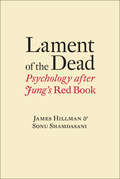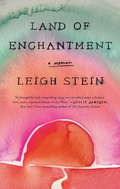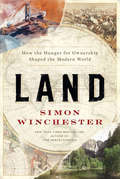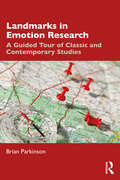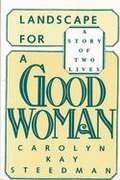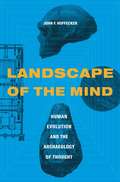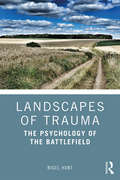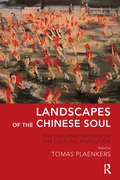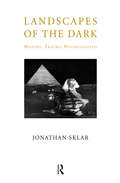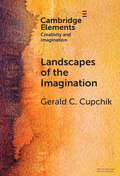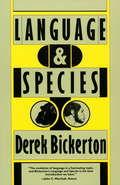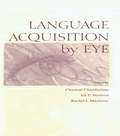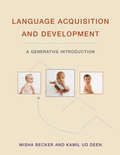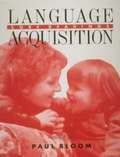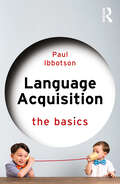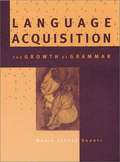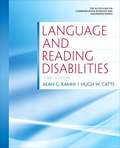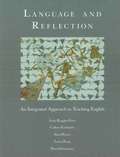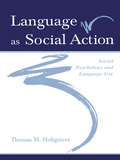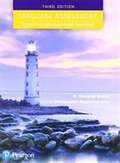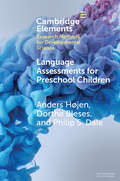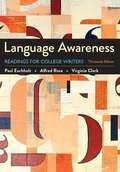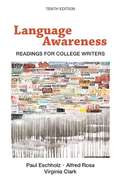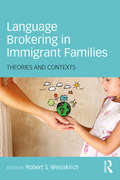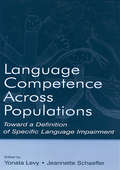- Table View
- List View
Lament of the Dead: Psychology After Jung's Red Book
by James Hillman Sonu ShamdasaniWith Jung's Red Book as their point of departure, two leading scholars explore issues relevant to our thinking today. In this book of dialogues, James Hillman and Sonu Shamdasani reassess psychology, history, and creativity through the lens of Carl Jung's Red Book. Hillman, the founder of Archetypal Psychology, was one of the most prominent psychologists in America and is widely acknowledged as the most original figure to emerge from Jung's school. Shamdasani, editor and cotranslator of Jung's Red Book, is regarded as the leading Jung historian. Hillman and Shamdasani explore a number of the issues in the Red Book--such as our relation with the dead, the figures of our dreams and fantasies, the nature of creative expression, the relation of psychology to art, narrative and storytelling, the significance of depth psychology as a cultural form, the legacy of Christianity, and our relation to the past--and examine the implications these have for our thinking today.
Land of Enchantment
by Leigh SteinSet against the stark and surreal landscape of New Mexico, Land of Enchantment is a coming-of-age memoir about young love, obsession, and loss, and how a person can imprint a place in your mind forever. When Leigh Stein received a call from an unknown number in July 2011, she let it go to voice mail, assuming it would be her ex-boyfriend Jason. Instead, the call was from his brother: Jason had been killed in a motorcycle accident. He was twenty-three years old. She had seen him alive just a few weeks earlier.Leigh first met Jason at an audition for a tragic play. He was nineteen and troubled and intensely magnetic, a dead ringer for James Dean. Leigh was twenty-two and living at home with her parents, trying to figure out what to do with her young adult life. Within months, they had fallen in love and moved to New Mexico, the "Land of Enchantment," a place neither of them had ever been. But what was supposed to be a romantic adventure quickly turned sinister, as Jason's behavior went from playful and spontaneous to controlling and erratic, eventually escalating to violence. Now New Mexico was marked by isolation and the anxiety of how to leave a man she both loved and feared. Even once Leigh moved on to New York, throwing herself into her work, Jason and their time together haunted her.Land of Enchantment lyrically explores the heartbreaking complexity of why the person hurting you the most can be impossible to leave.. With searing honesty and cutting humor, Leigh wrestles with what made her fall in love with someone so destructive and how to grieve a man who wasn't always good to her.
Land: How the Hunger for Ownership Shaped the Modern World
by Simon Winchester“In many ways, Land combines bits and pieces of many of Winchester’s previous books into a satisfying, globe-trotting whole. . . . Winchester is, once again, a consummate guide.”—Boston GlobeThe author of The Professor and the Madman, The Map That Changed the World, and The Perfectionists explores the notion of property—bought, earned, or received; in Europe, Africa, North America, or the South Pacific—through human history, how it has shaped us and what it will mean for our future.Land—whether meadow or mountainside, desert or peat bog, parkland or pasture, suburb or city—is central to our existence. It quite literally underlies and underpins everything. Employing the keen intellect, insatiable curiosity, and narrative verve that are the foundations of his previous bestselling works, Simon Winchester examines what we human beings are doing—and have done—with the billions of acres that together make up the solid surface of our planet.Land: How the Hunger for Ownership Shaped the Modern World examines in depth how we acquire land, how we steward it, how and why we fight over it, and finally, how we can, and on occasion do, come to share it. Ultimately, Winchester confronts the essential question: who actually owns the world’s land—and why does it matter?
Landmarks in Emotion Research: A Guided Tour of Classic and Contemporary Studies
by Brian ParkinsonThis unique book guides readers round 50 landmark studies in the psychology of emotion. It explores questions including what gives emotion its distinct emotional quality, whether our faces always reveal what we are feeling, and how we can be in control of our emotions.The book traces a route through both classic and contemporary studies, covering factors that make different emotions different, causal processes, emotion regulation, the perception and production of facial expressions, interpersonal and group processes, and emotion concepts. Each section presents a series of studies which complement and build on those discussed earlier. Each study is carefully discussed for students to understand the key methods, results, conclusions, limitations, and impacts for the field. Parkinson provides expert guidance through the key points, taking a fresh look at the research methods and results, presenting alternative approaches and interpretations, and assessing how the findings have advanced or hindered progress in the field.Offering a clear orientation to the psychological literature on emotion, this book will be highly relevant for undergraduate and graduate students of psychology, particularly those taking courses on emotion, social psychology, and cognitive psychology.
Landscape for a Good Woman: A Story of Two Lives
by Carolyn Kay SteedmanThis book is about lives lived out on the borderlands, lives for which the central interpretative devices of the culture don't quite work. It has a childhood at its centre - my childhood, a personal past - and it is about the disruption of that fifties childhood by the one my mother had lived out before me, and the stories she told about it.
Landscape of the Mind: Human Evolution and the Archaeology of Thought
by John HoffeckerIn Landscape of the Mind, John F. Hoffecker explores the origin and growth of the human mind, drawing on archaeology, history, and the fossil record. He suggests that, as an indirect result of bipedal locomotion, early humans developed a feedback relationship among their hands, brains, and tools that evolved into the capacity to externalize thoughts in the form of shaped stone objects. When anatomically modern humans evolved a parallel capacity to externalize thoughts as symbolic language, individual brains within social groups became integrated into a "neocortical Internet," or super-brain, giving birth to the mind.Noting that archaeological traces of symbolism coincide with evidence of the ability to generate novel technology, Hoffecker contends that human creativity, as well as higher order consciousness, is a product of the superbrain. He equates the subsequent growth of the mind with human history, which began in Africa more than 50,000 years ago. As anatomically modern humans spread across the globe, adapting to a variety of climates and habitats, they redesigned themselves technologically and created alternative realities through tools, language, and art. Hoffecker connects the rise of civilization to a hierarchical reorganization of the super-brain, triggered by explosive population growth. Subsequent human history reflects to varying degrees the suppression of the mind's creative powers by the rigid hierarchies of nationstates and empires, constraining the further accumulation of knowledge. The modern world emerged after 1200 from the fragments of the Roman Empire, whose collapse had eliminated a central authority that could thwart innovation. Hoffecker concludes with speculation about the possibility of artificial intelligence and the consequences of a mind liberated from its organic antecedents to exist in an independent, nonbiological form.
Landscapes of Trauma: The Psychology of the Battlefield
by Nigel HuntIntegrating trauma studies with historical research and social psychology, Landscapes of Trauma examines a range of battlefields from across history, including Waterloo, the Battle of Sedan, the Battle of the Ebro and the Battle of Normandy, to bring to light what these battlefields say about our collective and individual psyches. Hunt explores how war shapes the nature of trauma, not only by its innate horror but also by the historical and societal contexts it is fought in, from the cultural and social conventions of the period to the topography of the settings. This book provides a deep analysis of how war is experienced and remembered in different eras and by different generations. Moving beyond the clinical concept of post-traumatic stress disorder, Hunt discusses how trauma can be understood socially and historically, as well as through the lens of individual suffering. This book also investigates the psychological foundations of memorialisation, remembrance and commemoration that shape the legacy of the battles discussed. Using interviews with veterans, their letters, journals and diaries, as well as literary and historical sources, Hunt locates the battlefield as a place where humans explore the parameters of human behaviour, thought and emotion. This book is in important resource for students and scholars interested in the psychology of trauma and war, as well as military history.
Landscapes of the Chinese Soul: The Enduring Presence of the Cultural Revolution
by Tomas PlaenkersThis book documents the research project on the trauma of the Cultural Revolution in China and its intergenerational effects. It allows the reader to view the trauma through the perspective of 2,500 years of Chinese thought, and in the light of Chinese social history and governmental policy.
Landscapes of the Dark: History, Trauma, Psychoanalysis
by Jonathan SklarIn this important new collection of essays, Jonathan Sklar argues that the founding tension between Freud's commitment to interpretation and Ferenczi's extra parameter of 'being in the experience' has a central place/key role to play in contemporary psychoanalytic debate, and that this tension can best be understood by returning to the place of trauma in psychoanalysis. Taking this debate into the heart of the clinical setting, a set of extensive, penetrating and often disturbing case studies examine the evocation of the real as early trauma for many patients and its subsequent mental development - a case of schizophrenia, a man with a severe Tic (spasmodic Torticollis), and a neurotic with a somatic resistance to ending a long analysis.
Landscapes of the Imagination (Elements in Creativity and Imagination)
by Gerald C. CupchikThe idea that imagination is everywhere in our lives, and that reality is an illusion, may sound absurd to the concrete mind. This book will try to convince you that imagination manifests in different 'phases,' encompassing even the most fundamental ideas about what is real (ontology) and what is true (epistemology). It is present in the contents (e.g., images) and the acts (e.g., fantasy) of our minds. Imagination helps us remove barriers through conscious planning and finds ways to fulfill unconscious desires. The many words related to imagination in the English language are part of a unified web and share a “family resemblance.” The first section of this book deals with imagination in everyday life, the second focuses on aesthetic imagination, and the third discusses scholarly approaches that incorporate both imagination types. The fourth section proposes a unified model integrating the diverse ways that imagination is manifested in our culture.
Language & Species
by Derek BickertonThe classic work on the origins and evolution of language from the pioneering linguist and author of Adam&’s Tongue.Language and Species presents the most detailed and well-documented scenario to date of the origins of language. Drawing on "living linguistic fossils" such as "ape talk," the "two-word" stage of small children, and pidgin languages—as well as important discoveries in paleoanthropology—Bickerton shows how a primitive "protolanguage" could have offered Homo erectus a novel ecological niche. He goes on to demonstrate how this protolanguage could have developed into the languages we speak today."You are drawn into [Bickerton's] appreciation of the dominant role language plays not only in what we say, but in what we think and, therefore, what we are."—Robert Wright, New York Times Book Review "The evolution of language is a fascinating topic, and Bickerton's Language and Species is the best introduction we have."—John C. Marshall, Nature
Language Acquisition By Eye
by Charlene Chamberlain Jill P. Morford Rachel I. MayberryThis book focuses on the early acquisition of signed languages and the later development of reading by children who use signed languages. It represents the first collection of research papers focused solely on the acquisition of various signed languages by very young children--all of whom are acquiring signed languages natively, from deaf parents. It is also the first collection to investigate the possible relationships between the acquisition of signed language and reading development in school-aged children. The underlying questions addressed by the chapters are how visual-gestural languages develop and whether and how visual languages can serve the foundation for learning a second visual representation of language, namely, reading. Language Acquisition by Eye is divided into two parts, anchored in the toddler phase and the school-pupil phase. The central focus of Part I is on the earliest stages of signed language acquisition. The chapters in this part address important questions as to what "babytalk" looks like in signed language and the effect it has on babies' attention, what early babbling looks like in signed language, what babies' earliest signs look like, how parents talk to their babies in signed language to ensure that their babies "see" what's being said, and what the earliest sentences in signed languages tell us about the acquisition of grammar. With contrasting research paradigms, these chapters all show the degree to which parents and babies are highly sensitive to one another's communicative interactions in subtle and complex ways. Such observations cannot be made for spoken language acquisition because speech does not require that the parent and child look at each other during communication whereas signed language does. Part II focuses on the relationship between signed language acquisition and reading development in children who are deaf. All of these chapters report original research that investigates and uncovers a positive relationship between the acquisition and knowledge of signed language and the development of reading skills and as a result, represents a historical first in reading research. This section discusses how current theory applies to the case of deaf children's reading and presents new data that illuminates reading theory. Using a variety of research paradigms, each chapter finds a positive rather than a negative correlation between signed language knowledge and usage, and the development of reading skill. These chapters are sure to provide the foundation for new directions in reading research.
Language Acquisition and Development: A Generative Introduction
by Misha Becker Kamil Ud DeenAn introduction to the study of children's language development that provides a uniquely accessible perspective on generative/universal grammar–based approaches.How children acquire language so quickly, easily, and uniformly is one of the great mysteries of the human experience. The theory of Universal Grammar suggests that one reason for the relative ease of early language acquisition is that children are born with a predisposition to create a grammar. This textbook offers an introduction to the study of children's acquisition and development of language from a generative/universal grammar–based theoretical perspective, providing comprehensive coverage of children's acquisition while presenting core concepts crucial to understanding generative linguistics more broadly. After laying the theoretical groundwork, including consideration of alternative frameworks, the book explores the development of the sound system of language—children's perception and production of speech sound; examines how words are learned (lexical semantics) and how words are formed (morphology); investigates sentence structure (syntax), including argument structure, functional structure, and tense; considers such “nontypical” circumstances as acquiring a first language past infancy and early childhood, without the abilities to hear or see, and with certain cognitive disorders; and studies bilingual language acquisition, both simultaneously and in sequence.Each chapter offers a summary section, suggestions for further reading, and exercises designed to test students' understanding of the material and provide opportunities to practice analyzing children's language. Appendixes provide charts of the International Phonetic Alphabet (with links to websites that allow students to listen to the sounds associated with these symbols) and a summary of selected experimental methodologies.
Language Acquisition: Core Readings
by Paul BloomLanguage Acquisition offers, in one convenient reader, work by the most outstanding researchers in each field and is intended as a snapshot of the sort of theory and research taking place in language acquisition in the 1990s.
Language Acquisition: The Basics (The Basics)
by Paul IbbotsonLanguage Acquisition: The Basics is an accessible introduction to the must-know issues in child language development. Covering key topics drawn from contemporary psychology, linguistics and neuroscience, readers are introduced to fundamental concepts, methods, controversies, and discoveries. It follows the remarkable journey children take; from becoming sensitive to language before birth, to the time they string their first words together; from when they use language playfully, to when they tell stories, hold conversations, and share complex ideas. Using examples from 73 different languages, Ibbotson sets this development in a diverse cross-cultural context, as well as describing the universal psychological foundations that allow language to happen. This book, which includes further reading suggestions in each chapter and a glossary of key terms, is the perfect easy-to-understand introductory text for students, teachers, clinicians or anyone with an interest in language development. Drawing together the latest research on typical, atypical and multilingual development, it is the concise beginner's guide to the field.
Language Acquisition: The Growth of Grammar
by Maria Teresa GuastiThis text provides a comprehensive introduction to current thinking on language acquisition. Following an introductory chapter that discusses the foundations of linguistic inquiry, the book covers the acquisition of specific aspects of language from birth to about age 6. Topics include the language abilities of newborns, the acquisition of phonological properties of language, the lexicon, syntax, pronoun and sentence interpretation, control structures, specific language impairments, and the relationship between language and other cognitive functions. At the conclusion of each chapter are a summary of the material covered, a list of keywords, study questions, and exercises. The book, which adopts the perspective of Chomskyan Universal Generative Grammar throughout, assumes a familiarity with basic concepts of linguistic theory.
Language And Reading Disabilities
by Alan Kamhi Hugh CattsNow more than ever, increased attention has been given to students achieving adequate levels of reading proficiency. Maintaining its strong clinical and research basis, the third edition of Language and Reading Disabilities successfully keeps pace with the rapid changes in our knowledge about language and reading disabilities by providing readers with the most up-to-date advances in research and instruction in reading disabilities. This edition continues to cover a wide variety of theories by comparing and noting the similarities and differences between spoken and written language. This text is broad-based in its coverage of identification, assessment, and treatment of reading and writing disorders.
Language And Reflection: An Integrated Approach To Teaching English
by Anne Ruggles Gere Colleen Fairbanks Alan B. HowesThis methods book offers comprehensive coverage of English instruction built around a framework of theories of language... integrating material on literature, composition, and language into a cohesive blueprint for effective teaching.
Language As Social Action: Social Psychology and Language Use
by Thomas M. HoltgravesThis interdisciplinary synthesis of the social psychological aspects of language use provides an integrative and timely review of language as social action. The book successfully weaves together research from philosophy, linguistics, sociolinguistics, anthropology, social and cognitive psychology, pragmatics, and artificial intelligence. In this way, it clearly demonstrates how many aspects of social life are mediated by language and how understanding language use requires an understanding of its social dimension. Topics covered include: *speech act theory and indirect speech acts; *politeness and the interpersonal determinants of language; *language and impression management and person perception; *conversational structure, perspective taking; and *language and social thought. This volume should serve as a valuable resource for students and researchers in social psychology and communication who want a clear presentation of the linguistic underpinnings of social interaction. It will also be useful to cognitive psychologists and other language researchers who want a thorough examination of the social psychological underpinnings of language use. Although this book is relevant for a variety of disciplines, it is written in a clear and straightforward style that will be accessible for readers regardless of their orientation.
Language Assessment: Principles And Classroom Practices
by H. BrownLanguage Assessment: Principles and Classroom Practices is designed to offer a comprehensive survey of essential principles and tools for second language assessment. Its first and second editions have been successfully used in teacher-training courses, teacher certification curricula, and TESOL master of arts programs. As the third in a trilogy of teacher education textbooks, it is designed to follow H. Douglas Brown's other two books, Principles of Language Learning and Teaching (sixth edition, Pearson Education, 2014) and Teaching by Principles(fourth edition, Pearson Education, 2015). References to those two books are made throughout the current book. <P><P> Language Assessment features uncomplicated prose and a systematic, spiraling organization. Concepts are introduced with practical examples, understandable explanations, and succinct references to supportive research. The research literature on language assessment can be quite complex and assume that readers have technical knowledge and experience in testing. By the end of Language Assessment, however, readers will have gained access to this not-so-frightening field. They will have a working knowledge of a number of useful, fundamental principles of assessment and will have applied those principles to practical classroom contexts. They will also have acquired a storehouse of useful tools for evaluating and designing practical, effective assessment techniques for their classrooms.
Language Assessments for Preschool Children: Validity and Reliability of Two New Instruments Administered by Childcare Educators (Elements in Research Methods for Developmental Science)
by Anders Højen Dorthe Bleses Philip S. DaleThis Element has two main purposes. Firstly, it discusses purposes, advantages, and disadvantages as well as the challenges of different formats of language assessment, concluding with a focus on educator-administered language assessment in early childhood and education programs. It addresses the selection of assessment domains, the trade-off between brevity and precision, the challenge of assessing bilinguals, and accommodating the requirements of funders (e.g., government agencies) and users (e.g., educators and schools). It draws on lessons learned from developing two instruments for a national Danish-language and preliteracy assessment program. Secondly, it introduces those two educator-administered instruments-Language Assessment 3-6 (LA 3-6) and Language Assessment 2-year-olds (LA 2)-with respect to content, norming, gender and socioeconomic influences as well as psychometric qualities. The intention is that this experience can help enable the extension of the educator-based approach to other languages and contexts, while simultaneously acknowledging that linguistic and cultural adaptations are crucial.
Language Awareness: Readings For College Writers
by Paul Eschholz Alfred RosaLanguage Awareness helps students understand that writing makes things happen in the world. This collection teaches students how language operates and how it evolves over time?and this understanding, in turn, helps students use language more effectively in their own writing. The supportive apparatus includes unique Language in Action activities, which connect the everyday and the academic by examining current language-related debates that deepen students' understanding of each reading. <p><p> This beloved reader has stood the test of time and has been revised with feedback from instructors across the country. The new edition features a blend of classic and contemporary readings that examine a wide range of topics through the lens of language. New readings include a range of perspectives around current topics like "fake news," gender-neutral pronouns, and the #MeToo movement.
Language Awareness: Readings for College Writers , Tenth Edition
by Paul Eschholz Alfred Rosa Virginia ClarkLanguage Awareness collects seventy-seven classic and contemporary readings -- by author ranging from George Orwell to Toni Morrison -- treating the connections between language and politics, gender, media, technology, advertising, and prejudice. New Language Debates offer clusters of readings that treat one of three hot-button issues: "Should learning be censored?"; "Should English be the law?"; and "What's all the fuss about natural, organic, local foods?" Detailed guidance on effective reading, writing, and research habits and abundant suggestions for writing and discussion help students make the most of what they read as they develop as writers.
Language Brokering in Immigrant Families: Theories and Contexts
by Robert S. WeisskirchLanguage Brokering in Immigrant Families: Theories and Contexts brings together an international group of researchers to share their findings on language brokering—when immigrant children translate for their parents and other adults. Given the large amount of immigration occurring worldwide, it is important to understand how language brokering may support children’s and families’ acculturation to new countries. The chapter authors include overviews of the existing literature, insights from multiple disciplines, the potential benefits and drawbacks to language brokering, and the contexts that may influence children, adolescents, and emerging adults who language broker. With the latest findings, the authors theorize on how language brokering may function and the outcomes for those who do so.
Language Competence Across Populations: Toward a Definition of Specific Language Impairment
by Yonata Levy Jeannette SchaefferThis unique, edited book bridges studies in language disorders and linguistic theory with timely contributions from leading scholars in language development. It presents an attempt to define Specific Language Impairment, relating it to children of normal and disordered language capabilities. The chapter presentations examine language development across a variety of populations of children, from those with Specific Language Impairment to second language learners. The contributors discuss criteria for the definition of SLI, compare and contrast SLI with profiles of children with other disorders and dialects, and offer a comprehensive look at the Whole Human Language, which ties together spoken and signed languages. Methodological concerns that affect the credibility and generalizability of the findings are discussed and controversies between opposing linguistic approaches to language acquisition are presented. The conceptual thread that gradually reveals itself as the chapters unfold is a theoretical issue of central importance to cognitive theory, as well as to our understanding of the biological correlates of language--it concerns the variability that linguistic competence can manifest in children under different biological conditions and life circumstances. Language Competence Across Populations: Toward a Definition of Specific Language Impairment is an essential volume for advanced students and scholars in linguistics and psychology who have an interest in language acquisition and language disorders, as well as for the clinical professionals dealing with children with language impairments.
